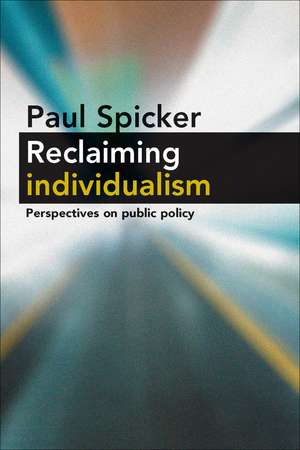Reclaiming Individualism: Perspectives on Public Policy
Autor Paul Spickeren Limba Engleză Hardback – 16 apr 2013
Reclaiming Individualism reviews the scope of individualist approaches to public policy, considering how they shape contemporary policy practices. It argues for a concept of individualism based on rights, human dignity, shared interests, and social protection, providing a thorough analysis and classification of individualism as applied to social and public policy. An important resource for those working or studying in these fields, it is a powerful restatement of some of the key values that led to the establishment of individualism as such a strong social force.
Preț: 829.71 lei
Preț vechi: 1077.55 lei
-23% Nou
Puncte Express: 1245
Preț estimativ în valută:
158.78€ • 164.77$ • 132.72£
158.78€ • 164.77$ • 132.72£
Carte tipărită la comandă
Livrare economică 17-31 martie
Preluare comenzi: 021 569.72.76
Specificații
ISBN-13: 9781447309086
ISBN-10: 1447309081
Pagini: 208
Dimensiuni: 152 x 229 x 20 mm
Greutate: 0.5 kg
Ediția:New.
Editura: Bristol University Press
Colecția Policy Press
ISBN-10: 1447309081
Pagini: 208
Dimensiuni: 152 x 229 x 20 mm
Greutate: 0.5 kg
Ediția:New.
Editura: Bristol University Press
Colecția Policy Press
Notă biografică
Paul Spicker is Grampian Chair of Public Policy at the Robert Gordon University and is the author of several books, including How Social Security Works, also published by the Policy Press.
Cuprins
List of tables and figures
About the author
About the author
Introduction: Six impossible things before breakfast
Part One: Individualism
1.1 Individualism
Moral individualism
Methodological individualism
Substantive individualism
1.2 Individualism and collectivism
Individual and collective discourses
Part Two: The moral dimensions of individualism
2.1 Individual value and individual rights
Dignity, respect and rights
Individual rights
The equality of persons
2.2. Autonomy and self-determination
Choice
Self-development
2.3 Personal responsibility
Reward and punishment
Individualism and moral judgments
2.4 Possessive individualism
Property
Self-ownership
2.5 Individual welfare
Individualism and individual welfare
Part Three: Methodological individualism and rational self-interest
3.1 Utility and choice
Utility
Preference and choice
Choice and well-being
3.2 Self-interest
Incentives and motivation
3.3 Rationality
Indifference curves
The maximisation of utility
Some methodological problems
3.4 The Pareto principle
The problem in inequality
Part Four: Substantive policy
4.1 Choice and the market
How markets reconcile choices
The limits to markets
Market failure
4.2 More of the market: one solution for everything
Structural adjustment
The price mechanism
Rationing by price
4.3 Personalised services
Personalised approaches
Personalisation in practice
4.4 The individualisation of social policy
Part Five: Individuals and collective action
5.1 Individual and social choices
5.2 Collective action
Collective action and the individual
The tragedy of the commons
5.3 Solidarity and voluntary collective action
Social protection
Redistribution and solidarity
5.4 Public services
Non-market failure
Public services and the individual
Part Six: Government and public policy
6.1 The individual versus the state
The minimal state
The liberal state
6.2 The role of government
Democracy
The welfare state
6.3 The moral agenda
Translating moral purposes into practice
The objections to government action
6.4 Social policy and the individual
Reclaiming individualism: individualist public policies
1.1 Individualism
Moral individualism
Methodological individualism
Substantive individualism
1.2 Individualism and collectivism
Individual and collective discourses
Part Two: The moral dimensions of individualism
2.1 Individual value and individual rights
Dignity, respect and rights
Individual rights
The equality of persons
2.2. Autonomy and self-determination
Choice
Self-development
2.3 Personal responsibility
Reward and punishment
Individualism and moral judgments
2.4 Possessive individualism
Property
Self-ownership
2.5 Individual welfare
Individualism and individual welfare
Part Three: Methodological individualism and rational self-interest
3.1 Utility and choice
Utility
Preference and choice
Choice and well-being
3.2 Self-interest
Incentives and motivation
3.3 Rationality
Indifference curves
The maximisation of utility
Some methodological problems
3.4 The Pareto principle
The problem in inequality
Part Four: Substantive policy
4.1 Choice and the market
How markets reconcile choices
The limits to markets
Market failure
4.2 More of the market: one solution for everything
Structural adjustment
The price mechanism
Rationing by price
4.3 Personalised services
Personalised approaches
Personalisation in practice
4.4 The individualisation of social policy
Part Five: Individuals and collective action
5.1 Individual and social choices
5.2 Collective action
Collective action and the individual
The tragedy of the commons
5.3 Solidarity and voluntary collective action
Social protection
Redistribution and solidarity
5.4 Public services
Non-market failure
Public services and the individual
Part Six: Government and public policy
6.1 The individual versus the state
The minimal state
The liberal state
6.2 The role of government
Democracy
The welfare state
6.3 The moral agenda
Translating moral purposes into practice
The objections to government action
6.4 Social policy and the individual
Reclaiming individualism: individualist public policies
Index
Index of names
Recenzii
"A book with much relevance for students and scholars of social and public policy and, indeed, for anyone who wishes to understand more about the dominant paradigms of public policy."
“A most thorough exploration of a wide variety of issues related to ‘the individual’ as an idea in social policy discussion.”
“A useful exploration of the differing approaches within the individualist tradition, bringing together discussion of the whole field of individualistic thought and public policy.”
"Reclaiming individualism is fantastically interesting. It raids an enormous range from across disciplines, and is the product of some very hard thinking and some provocative analysis."



























